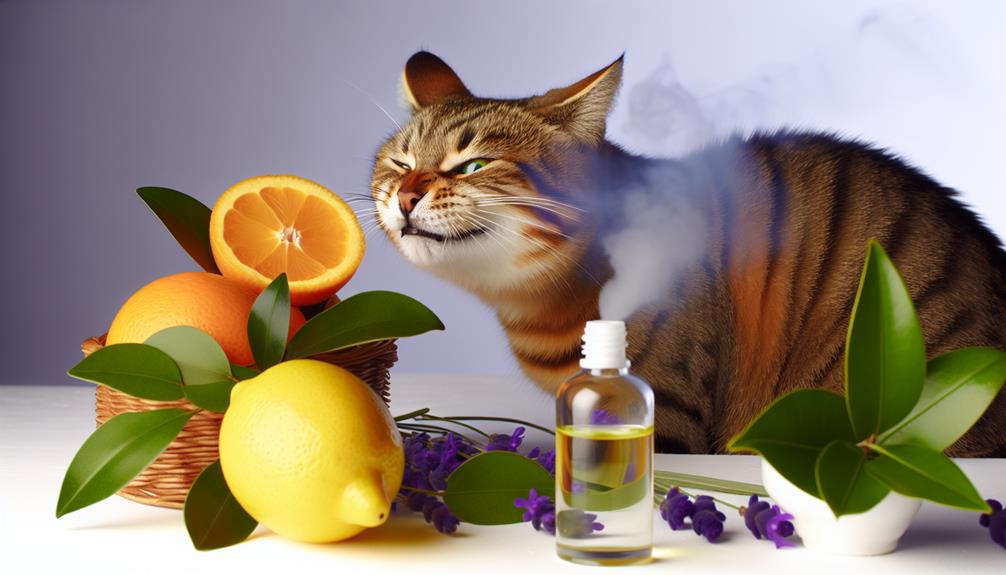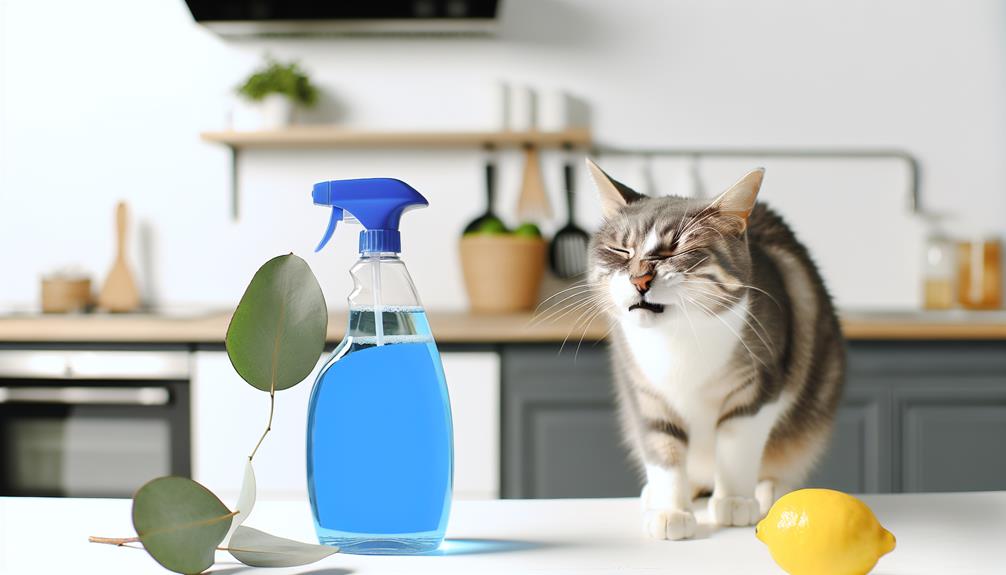You might think your cat is indifferent to most smells, but they actually have quite a few aversions. For instance, citrus scents like oranges and lemons can be particularly off-putting to them due to their volatile compounds. Vinegar, with its pungent odor, and spicy aromas like cayenne pepper and mustard also rank high on their list of dislikes. Essential oils, such as lavender and eucalyptus, and many commercial cleaning products contain strong fragrances that irritate their sensitive noses. Curious about why these smells have such a strong impact on your feline friend?
Citrus Scents
When it comes to olfactory aversions for felines, citrus scents top the list. You might find that your cat exhibits a pronounced aversion to the smell of citrus fruits such as oranges, lemons, and grapefruits. This aversion is mainly due to the presence of certain volatile organic compounds found in these fruits. Limonene, linalool, and citral are the primary compounds contributing to the strong, pungent aroma that cats find unpleasant.
In scientific terms, the olfactory system of felines is highly sensitive and capable of detecting these compounds at very low concentrations. The olfactory receptors in a cat's nose are specialized to pick up a broad range of scents, making them particularly sensitive to the potent aromatics found in citrus oils. When exposed to these scents, cats may exhibit behaviors indicative of discomfort or avoidance, such as retreating from the area, excessive sneezing, or even gagging.
For practical applications, you can use citrus oils as a natural deterrent to keep cats away from certain areas or objects. For instance, a few drops of citrus oil applied to a cotton ball and placed in a restricted area can effectively discourage feline intrusion. However, it's essential to verify that the concentration of citrus oils is not excessively high, as this could lead to respiratory distress or other adverse reactions in your cat.
Vinegar
Among the various scents that cats find off-putting, vinegar stands out as a particularly effective deterrent. This acetic acid solution, commonly found in households, has a pungent odor that is highly aversive to felines. Your cat's olfactory system, which is remarkably more sensitive than that of humans, can detect even minute concentrations of vinegar. This makes it an ideal candidate for discouraging undesirable feline behaviors.
One of the primary vinegar uses in feline deterrence involves its application in areas where you want to prevent your cat from trespassing. For instance, diluting vinegar with water in a 1:1 ratio and spraying it on surfaces can effectively repel cats. This method is particularly beneficial for safeguarding furniture, countertops, and garden beds. Additionally, vinegar can be used to neutralize odors that may attract cats, additionally enhancing its repellent properties.
The vinegar benefits extend beyond mere deterrence. Its natural, non-toxic composition guarantees that it poses minimal risk to both your pets and the environment. This is a stark contrast to chemical repellents, which may carry potential health hazards. Moreover, vinegar possesses antibacterial and antifungal properties, making it a dual-purpose agent for both cleaning and deterring.
Essential Oils

Why do essential oils often make effective feline deterrents? The olfactory system of cats is highly sensitive, and certain essential oils contain volatile compounds that can be particularly aversive to them. Essential oils, such as lavender oil and eucalyptus oil, emit strong scents that can overwhelm a cat's acute sense of smell, thus acting as effective deterrents.
Lavender oil, derived from the Lavandula plant, contains linalool and linalyl acetate, compounds known for their strong aromatic properties. While humans often find the scent of lavender calming, cats generally find it repellent. The high concentration of these volatile compounds can cause sensory overload in felines, leading to behavioral changes such as avoidance or even stress-induced reactions. As a result, applying lavender oil in areas you wish to keep cat-free can be particularly effective.
Eucalyptus oil, extracted from the leaves of Eucalyptus trees, is another essential oil that deters cats. This oil contains eucalyptol (also known as cineole), a compound with a potent aroma that cats find disagreeable. The inhalation of eucalyptol can cause respiratory distress in felines, making eucalyptus oil a strong deterrent. However, it's vital to use it sparingly and responsibly, as its potent nature can pose health risks if ingested or inhaled in large quantities.
Spicy Aromas
In addition to essential oils, spicy aromas also serve as potent feline deterrents due to their intense and sometimes irritating nature. Cats possess an acute sense of smell, and certain spicy food and aromatic herbs can overwhelm their olfactory receptors, resulting in aversion. These aromatic compounds engage the trigeminal nerve, which transmits sensory information, including pain and irritation, leading to a strong avoidance behavior.
Several specific spicy aromas are particularly effective in repelling cats:
- Cayenne Pepper: The capsaicin in cayenne pepper causes a burning sensation, making areas treated with this spice unappealing to cats.
- Mustard: The pungent aroma of mustard seeds or mustard-based products can serve as an effective deterrent, creating an environment cats prefer to avoid.
- Cinnamon: While often associated with warmth and comfort in humans, the sharp, spicy scent of cinnamon is unpleasant to cats.
- Curry Powder: A mixture of various spices, curry powder emits a complex and potent aroma that can deter feline presence due to its intensity.
When utilizing these spicy aromas, it's vital to apply them judiciously and guarantee that they are kept out of reach of cats. Direct ingestion or extended exposure can potentially cause discomfort or harm. As a result, sprinkling a small amount in target areas where you wish to deter feline activity is typically sufficient.
Understanding the potency of these spicy aromas can be a valuable tool in managing and modifying cat behavior. By leveraging the natural aversion cats have to these scents, you can create a more harmonious living environment, effectively reducing undesirable feline behaviors without resorting to more invasive methods.
Cleaning Products

Cleaning products often contain chemicals and fragrances that are particularly offensive to cats' sensitive olfactory systems. Cats possess a highly developed sense of smell, which is approximately 14 times stronger than that of humans. This heightened olfactory capability makes them extremely susceptible to the odors emanating from household cleaning agents. The chemical residues left behind by these products can be particularly bothersome.
When you use cleaning products containing artificial fragrances, you're introducing volatile organic compounds (VOCs) into the environment. These VOCs can linger in the air and on surfaces, making it difficult for your cat to escape their pervasive presence. Many commercial cleaning products are formulated with a variety of synthetic chemicals designed to mask unpleasant odors or to impart a sense of freshness. However, these same compounds can act as irritants to a cat's nasal passages, leading to discomfort or even respiratory distress.
Additionally, some cleaning agents contain ammonia, chlorine, and formaldehyde, all of which produce noxious fumes that can be particularly harmful to cats. Chronic exposure to these substances can lead to long-term health issues, including respiratory disorders and skin irritations. When choosing cleaning products, it's important to reflect on their composition and potential impact on your feline companion.
To mitigate these risks, opt for pet-safe cleaning products that are free from artificial fragrances and harsh chemicals. Natural alternatives, such as vinegar and baking soda, can effectively clean surfaces without leaving harmful chemical residues. By making informed choices about the cleaning products you use, you can create a safer and more comfortable environment for your cat.
Conclusion
To summarize, understanding the olfactory sensitivities of cats can help you create a more harmonious environment. Cats find citrus scents, vinegar, essential oils, spicy aromas, and many cleaning products as repulsive as a human might find a pungent, rotting odor. By avoiding or carefully managing these smells, you can minimize discomfort behaviors and foster a more comfortable living space for your feline companion. Always be mindful of their heightened sense of smell and its impact on their well-being.
